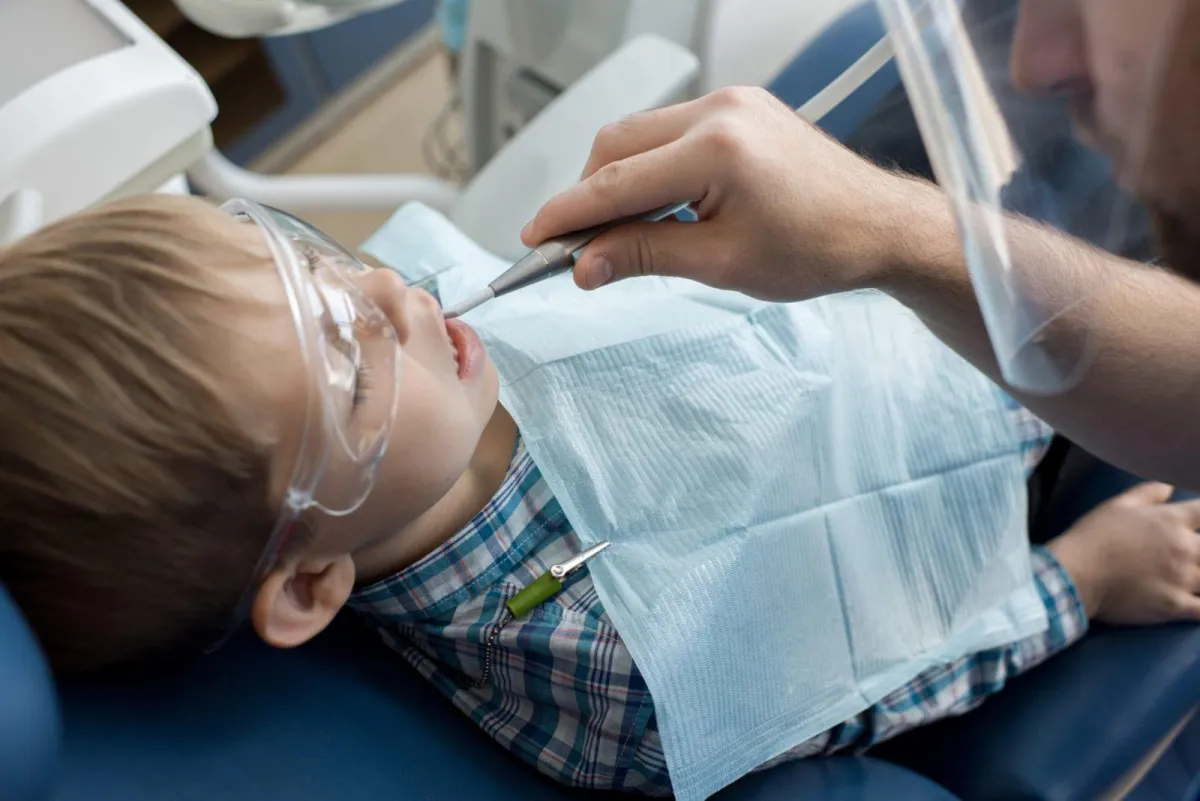Read All About It
Dental Related Articles


Sedation Dentistry for Your Child
Sedation Dentistry for Pediatric Patients
Sedation dentistry … You hear the term all the time, but what is it exactly? By definition, sedation dentistry is the use of a mild, calming, sedative medication to ease anxiety or to help in special situations. It is not a pain-relieving medication, and it wears off in usually a few hours.
Why would my child need sedation dentistry for procedures?
In most cases, sedation dentistry is not necessary.
However, there are times when sedation can help calm an overly anxious minor child, a special needs child, a child who is having multiple procedures done at the same time, or simply a child who has difficulty sitting still for any amount of time. Other reasons sedation dentistry may be used are for those patients with a strong gag reflex or for ones who have extremely sensitive teeth.
What are the options for sedation dentistry?
There are different types and levels of sedation and deciding which to use depends on the situation. Levels of sedation dentistry include:
Mild sedation – The patient is awake, coherent, but relaxed.
Moderate sedation – The patient may not make sense when speaking or may slur their words. Afterward, the patient may not remember much about it.
Deep sedation – The patient is barely conscious but is still awake.
Full sedation – This involves general anesthesia, and the patient is unconscious. This is often performed as IV Sedation.
Your dentist will discuss with you the best method of sedation dentistry to use and other sedation options. After consultation and considering patient demeanor and medical information, your pediatric dentist may choose:
Inhalant sedation – Nitrous oxide, otherwise known as “laughing gas” is inhaled through a mask placed over your nose and mouth. The dentist can control how much gas is given because the gas is mixed with oxygen. The mask remains on the face with a flow of nitrous oxide during the procedure. Afterward, the gas is turned off and the patient breathes pure oxygen for a few minutes to clear their lungs of the gas.
The gas tends to wear off quickly, and so is an appropriate form of sedation for many types of procedures. Children can have a light meal before this type of sedation is given, if desired.Oral sedation – Sedation dentistry is a type of dental care that uses mild sedatives to help children relax and feel comfortable during dental procedures. This can be helpful for children with special needs, anxiety, or a strong gag reflex. Sedation can also be used when multiple procedures need to be done at the same time, or when the safety of the child may be compromised.
The sedatives used in sedation dentistry are typically safe and effective. They can help children feel calm and relaxed, and they can also help to reduce pain and anxiety. Sedation dentistry can be a valuable tool for helping children get the dental care they need, even if they are anxious or have special needs.
Sedation of this nature is given either via pill form, through the nose, or under the tongue. It takes about 20 minutes for the medication to take effect and produce drowsiness. If your child is having this type of sedation, they should not eat or drink after midnight the night before.Intravenous sedation – IV sedation is administered directly into the vein and produces a calming effect more quickly than the other methods. The dentist can adjust the amount given during the procedure and give more if needed for a longer procedure. Your child’s heart rate, blood pressure, temperature, and blood oxygen level will be continuously monitored during the procedure.
Preparation at home is needed before intravenous sedation. The dental staff will call before your appointment to provide pre-procedure instructions on eating and drinking. Preparing your child for IV sedation varies based on the child’s age. For example, for children up to 12 months of age, formula-fed babies can have a bottle six hours before their appointment. Breastfed babies can nurse four hours before their appointment.
All children cannot have solid food or non-clear liquids after midnight the day before the procedure. Two hours before the procedure, they may only have clear liquids. Give your child normal medications unless you are told not to.What can I do to comfort my child during the sedation process?
If your dentist allows it, you may stay with your child as they get sleepy. To help comfort a child, parents can bring along a favorite stuffed animal or cuddle blanket the child can hold. It may also help if the parent gently caresses their child’s hand, face, or hair and talks softly to them or even sings a lullaby song.
Once your child is very sleepy, the dentist may ask you to wait in the lobby and then bring you back to the recovery room once the procedure is complete.What happens during recovery after sedation?
In the recovery room, the time the parents wait for their child may differ as children respond to sedation in varying ways. It may take some children longer than others to become fully awake and alert.
When waking up, your child may cry, act fussy, be nauseated, or even vomit. All of these reactions are completely normal. When you leave, your child may still be groggy and should not return to school. They should take it easy for the remainder of the day.
How soon can my child eat after a dental procedure?
Children may be quite hungry after the procedure is complete, but be aware that their mouth and gums may still be numb for several hours afterward. Be cautious about the type and quantity of food they consume.
The best scenario is to wait for several hours before offering something to eat, and once you do, only offer soft foods. Be sure to monitor your young child while they eat to be sure they are not biting the inside of their cheeks or tongue.When do I notify the dentist of a problem?
Your dentist will see your child back for a scheduled follow up appointment. However, if there are any issues in the meantime, call the dentist immediately. Reasons to call the dentist include:
Excessive pain that cannot be controlled by normal doses of pain relievers
Fever
Vomiting
Excessive bleeding
Can any dentist perform sedation dentistry procedures?
Most dentists can perform minimal sedation, while more and more dentists can administer moderate sedation. But only a small percentage of dentists can perform deep or full sedation. Most of the dentists that perform it are maxillofacial surgeons or dental anesthesiologists.
Many states require dentists to hold certification to perform sedation dentistry on minors. This requirement depends on the decision by the dental board in each state.Is sedation dentistry safe?
Sedation dentistry is safe when performed by qualified dentists. Some patients with certain underlying conditions, such as diabetes, obesity, or sleeping/breathing issues may be at a higher risk.
Be sure to find out your dentist’s qualifications and how many sedation dentistry procedures they have performed (the higher the number, the better). Ensure that the dentist has accounted for your child’s proper weight, age, and general health.
Inform the dentist of any medications your child is taking or any medical procedures they are currently undergoing. Discuss a complete list of risks with your pediatric dentist in advance. Finally, be sure there are oxygen and medicines to reverse the effect of sedation on hand at the dental office.No matter the type or level, sedation dentistry can be a sleepy solution for an anxious child or one with special needs.
Next Steps
If you have any additional questions or would like to schedule an appointment for your child, please feel free to contact us at
Custom HTML/CSS/JAVASCRIPT

19 INVERNESS CENTER PARKWAY, STE 250, BIRMINGHAM, AL 35242
TEL: 205.969.7454
E-MAIL: [email protected]
2018 © ALL RIGHTS RESERVED | PRIVACY POLICY | TERMS AND CONDITIONS
Site by Trustway Marketing Powered by Kyrios Systems
